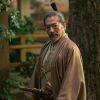Shardlake (TV Series)
As this week presented me with the sad news of novelist C.J. Sansom's death, watching the filmed version of the first of his Shardlake novels was a mixed affair in more ways than one. Overall: I didn't love the four parter (currently available in my part of the world on Disney +) the way I hoped I would, but neither did I dislike it, and what problems I had are largely fixable should the show continue and move on to the later novels.
One of the problems was inevitable from the start: Dissolution, the first Shardlake novel, which the first season of the tv show is based on, is not exactly my personal favourite and in many ways one of the weaker books. (Imo, as always. Pace, Dissolution fans.) (Weak compared with the later novels, which is good news to us readers, right? Would be terrible if Sansom had never matched or surpassed his start! It still means Dissolution is much better than many another Tudor era novel and/or historical mystery.) It's not exactly that it has early installment weirdness - it fits right into with the later continuity - as much as the later character development makes everyone who makes it into the later novels feel like a richer character. Also, by the time I got around to Dissolution, I had read one too many murder-in-a-monastery book, whereas the settings and plots of the later novels (I had in fact started with the third one, Sovereign, and then gone back to catch up with the earlier ones) felt far more original.
Now, the tv series made a key creative decision which I can get behind, even though it necessitated a somewhat different ending, and that is to replace Matthew Shardlake's (unwilling) sidekick from the first novel, Mark, with Jack Barak who is basically the major supporting character from the second novel onwards. I had osmosed this from the advance publicity, and I immediately understood why: Mark never shows up again, he's not a very interesting character in his own right, as opposed to Jack Barak, the developing Shardlake and Barak relationship is one of the strengths of the show. However, precisely because Mark and Jack are different characters, I wondered how that would work out with parts of the plot because I couldn't see Barak making the same decisions. I'm happy to report, to put it in an unspoilery to non-readers fashion, that the tv series accounted for that and didn't just give Barak Mark's lines but did take the trouble of trying to figure out how Jack would have reacted in Mark's place in those situations, and account for the differences.
Another early introduction in the tv series I was less certain about, to wit: the Duke of Norfolk. Again, I think I can see the reasoning, because Norfolk is the big antagonist in the second novel, Dark Fire, and thus presumably of the second season, and if you introduce him here already, you don't have to explain who he is then. However, I think the screen time spent on Norfolk would have been better spent on including instead some of the interactions between Shardlake and the villagers near the monastery, not least because the way he relates to and listens to the non-powerful is one of his most appealing traits.
(Sidenote: watching, I remembered joking with![[profile]](https://www.dreamwidth.org/img/silk/identity/user.png) sonetka of how Norfolk is the one Henrician character whom every novelist/dramatist/tv and movie scribe seems to loathe, no matter whom else they champion or despise, and it's not hard to see why, between the bigotry, the book loathing, the certified wife abuse and the nieces using and dumping, and so forth. She agreed that it would be near impossible to woobify Norfolk, which promptly had me imagining how a novelist would do it regardless, and I concluded it would have to be done via a mixture of the tried and true hard childhood approach, plus emphasizing his loyalty and life long commitment to his lower born mistress and elevate it to True Love Across The Classes status, and vilfy his wife as the true abuser of the marriage by emphasizing she didn't get along with their children, either.)
sonetka of how Norfolk is the one Henrician character whom every novelist/dramatist/tv and movie scribe seems to loathe, no matter whom else they champion or despise, and it's not hard to see why, between the bigotry, the book loathing, the certified wife abuse and the nieces using and dumping, and so forth. She agreed that it would be near impossible to woobify Norfolk, which promptly had me imagining how a novelist would do it regardless, and I concluded it would have to be done via a mixture of the tried and true hard childhood approach, plus emphasizing his loyalty and life long commitment to his lower born mistress and elevate it to True Love Across The Classes status, and vilfy his wife as the true abuser of the marriage by emphasizing she didn't get along with their children, either.)
Something I definitely disliked about the tv show was the soundtrack. Look, one thing that's consistent about the novels (including the first one) is that they are by and large subtle in their characterisations, the very occasional explicit boo-hiss figure from the get go excepted. And even those can have humanizing moments. Meanwhile, the tv show has one of those very obtrustive soundtracks which do not trust their audience the least bit: This is spooky! This is a creep! Here's a good person! And good lord, just because the main setting is a monastery, did you have to use generic chants at every second moment? Also, speaking about not trusting your audience: look, I empathize about the difficulty of translating a novel that's written in first person to a tv show where the protagonist does not yet have the relationships he will later have where he could share some key thoughts via dialogue instead, but I'm not sure Shardlake muttering to himself when alone in his room was the ideal way to resolve the dilemma. All the more because the actor playing him, Arthur Hughes, is really good and could have conveyed said thoughts and emotions by silent acting instead. (A case in point where he does this because for a change the script trusted him to do so is ( slightly spoilery ). Hughes conveyes all Matthew Shardlake is thinking at that moment in the novel by facial expression, and I was really glad the script trusted him to do that, and thought, more of that, please, show.)
Talking about the actors brings me to the plusses of the series: in terms of acting ability, I'm good with all the main characters casting, but especially Hughes, and he also has a good sparring chemistry with Anthony Boyle as Jack Barak. (Speaking of Boyle, he captures both the cheekiness and chip-on-the-shoulder swagger and the underlying vulnerability of early Barak.= I also think that the part of Alice is one case where getting out of Shardlake's head and being in a visual medium benefited the character. Sean Bean is good as Thomas Cromwell, though that's another case where I think the writing for the show loses some of the novel's richer and more subtle characterisation. ( Spoilery observation to follow. )
The one element of casting where I'm torn as hell is a) Guy, and b) the colourblind casting some other characters. Now, with another non-Shardlake Tudor story, I'd be fine with colourblind casting. But (Brother) Guy - introduced in Dissolution but continuing to become a regular character in all the novels, and probably my personal favourite - in the novels is very explicitly a black character. He's originally from Al Andalus, i.e. Granada, but while his family had to convert, Guy himself is a sincere Christian (Catholic).) Yes, the term "Moor" in Tudor English could be used for both Arab and black people, but the way Guy's skin colour is described in the narration makes it clear he's not seen as Caucasian. Both Guy being originally Spanish and Guy being black colours, no pun intended, how people who encounter him react to him through the novels, the later far more than the former. (And then there's him being Catholic, which becomes dangerous in different degrees depending on how Henry defines his own religion in the subsequent years.) In the tv show, by contrast, Guy is played by Irfan Shamiji who is not black. On the other hand, the Abbot and Brother Gabriel (both characters who, unlike Guy, won't show up again) are played by black actors, and so are some nameless flunkies in Cromwell's and Norfolk's staff. (And no one, of course, is startled by Guy's looks, though it's remarked by his accent that he's from Spain.) Basically, the way it looks to me, the show traded an important long term character being black in Tudor England and this being part of his overall existence for the colourblind casting of a couple of one-off characters, and no matter how well intended, I don't think that's good representation.
(For what it's worth: no notes on Irfan Shamiji's acting as Guy. He's fine.)
In conclusion: as I said, most of what bothered me about this first season is fixable if they get a second season. A less sledgehammery soundtrack, more confidence in actors' ability to convey thoughts - that should be doable. And like I said - the first of the novels wasn't my favourite, either, so there is ample room of improvement, and I would like to see Hughes playing Shardalke through the decades of his life that the novels chronicle. This entry was originally posted at https://selenak.dreamwidth.org/1578044.h
One of the problems was inevitable from the start: Dissolution, the first Shardlake novel, which the first season of the tv show is based on, is not exactly my personal favourite and in many ways one of the weaker books. (Imo, as always. Pace, Dissolution fans.) (Weak compared with the later novels, which is good news to us readers, right? Would be terrible if Sansom had never matched or surpassed his start! It still means Dissolution is much better than many another Tudor era novel and/or historical mystery.) It's not exactly that it has early installment weirdness - it fits right into with the later continuity - as much as the later character development makes everyone who makes it into the later novels feel like a richer character. Also, by the time I got around to Dissolution, I had read one too many murder-in-a-monastery book, whereas the settings and plots of the later novels (I had in fact started with the third one, Sovereign, and then gone back to catch up with the earlier ones) felt far more original.
Now, the tv series made a key creative decision which I can get behind, even though it necessitated a somewhat different ending, and that is to replace Matthew Shardlake's (unwilling) sidekick from the first novel, Mark, with Jack Barak who is basically the major supporting character from the second novel onwards. I had osmosed this from the advance publicity, and I immediately understood why: Mark never shows up again, he's not a very interesting character in his own right, as opposed to Jack Barak, the developing Shardlake and Barak relationship is one of the strengths of the show. However, precisely because Mark and Jack are different characters, I wondered how that would work out with parts of the plot because I couldn't see Barak making the same decisions. I'm happy to report, to put it in an unspoilery to non-readers fashion, that the tv series accounted for that and didn't just give Barak Mark's lines but did take the trouble of trying to figure out how Jack would have reacted in Mark's place in those situations, and account for the differences.
Another early introduction in the tv series I was less certain about, to wit: the Duke of Norfolk. Again, I think I can see the reasoning, because Norfolk is the big antagonist in the second novel, Dark Fire, and thus presumably of the second season, and if you introduce him here already, you don't have to explain who he is then. However, I think the screen time spent on Norfolk would have been better spent on including instead some of the interactions between Shardlake and the villagers near the monastery, not least because the way he relates to and listens to the non-powerful is one of his most appealing traits.
(Sidenote: watching, I remembered joking with
Something I definitely disliked about the tv show was the soundtrack. Look, one thing that's consistent about the novels (including the first one) is that they are by and large subtle in their characterisations, the very occasional explicit boo-hiss figure from the get go excepted. And even those can have humanizing moments. Meanwhile, the tv show has one of those very obtrustive soundtracks which do not trust their audience the least bit: This is spooky! This is a creep! Here's a good person! And good lord, just because the main setting is a monastery, did you have to use generic chants at every second moment? Also, speaking about not trusting your audience: look, I empathize about the difficulty of translating a novel that's written in first person to a tv show where the protagonist does not yet have the relationships he will later have where he could share some key thoughts via dialogue instead, but I'm not sure Shardlake muttering to himself when alone in his room was the ideal way to resolve the dilemma. All the more because the actor playing him, Arthur Hughes, is really good and could have conveyed said thoughts and emotions by silent acting instead. (A case in point where he does this because for a change the script trusted him to do so is ( slightly spoilery ). Hughes conveyes all Matthew Shardlake is thinking at that moment in the novel by facial expression, and I was really glad the script trusted him to do that, and thought, more of that, please, show.)
Talking about the actors brings me to the plusses of the series: in terms of acting ability, I'm good with all the main characters casting, but especially Hughes, and he also has a good sparring chemistry with Anthony Boyle as Jack Barak. (Speaking of Boyle, he captures both the cheekiness and chip-on-the-shoulder swagger and the underlying vulnerability of early Barak.= I also think that the part of Alice is one case where getting out of Shardlake's head and being in a visual medium benefited the character. Sean Bean is good as Thomas Cromwell, though that's another case where I think the writing for the show loses some of the novel's richer and more subtle characterisation. ( Spoilery observation to follow. )
The one element of casting where I'm torn as hell is a) Guy, and b) the colourblind casting some other characters. Now, with another non-Shardlake Tudor story, I'd be fine with colourblind casting. But (Brother) Guy - introduced in Dissolution but continuing to become a regular character in all the novels, and probably my personal favourite - in the novels is very explicitly a black character. He's originally from Al Andalus, i.e. Granada, but while his family had to convert, Guy himself is a sincere Christian (Catholic).) Yes, the term "Moor" in Tudor English could be used for both Arab and black people, but the way Guy's skin colour is described in the narration makes it clear he's not seen as Caucasian. Both Guy being originally Spanish and Guy being black colours, no pun intended, how people who encounter him react to him through the novels, the later far more than the former. (And then there's him being Catholic, which becomes dangerous in different degrees depending on how Henry defines his own religion in the subsequent years.) In the tv show, by contrast, Guy is played by Irfan Shamiji who is not black. On the other hand, the Abbot and Brother Gabriel (both characters who, unlike Guy, won't show up again) are played by black actors, and so are some nameless flunkies in Cromwell's and Norfolk's staff. (And no one, of course, is startled by Guy's looks, though it's remarked by his accent that he's from Spain.) Basically, the way it looks to me, the show traded an important long term character being black in Tudor England and this being part of his overall existence for the colourblind casting of a couple of one-off characters, and no matter how well intended, I don't think that's good representation.
(For what it's worth: no notes on Irfan Shamiji's acting as Guy. He's fine.)
In conclusion: as I said, most of what bothered me about this first season is fixable if they get a second season. A less sledgehammery soundtrack, more confidence in actors' ability to convey thoughts - that should be doable. And like I said - the first of the novels wasn't my favourite, either, so there is ample room of improvement, and I would like to see Hughes playing Shardalke through the decades of his life that the novels chronicle. This entry was originally posted at https://selenak.dreamwidth.org/1578044.h



